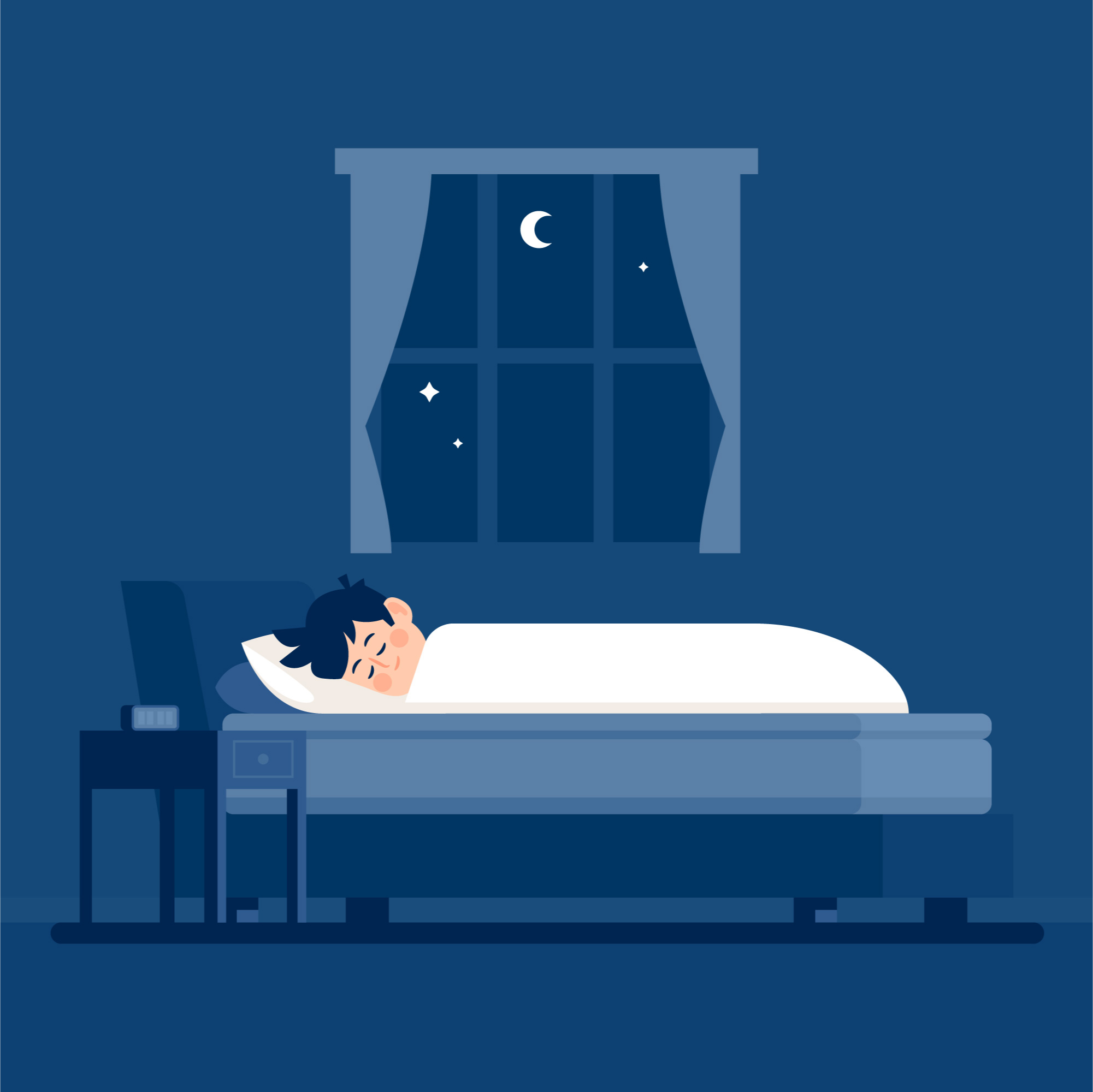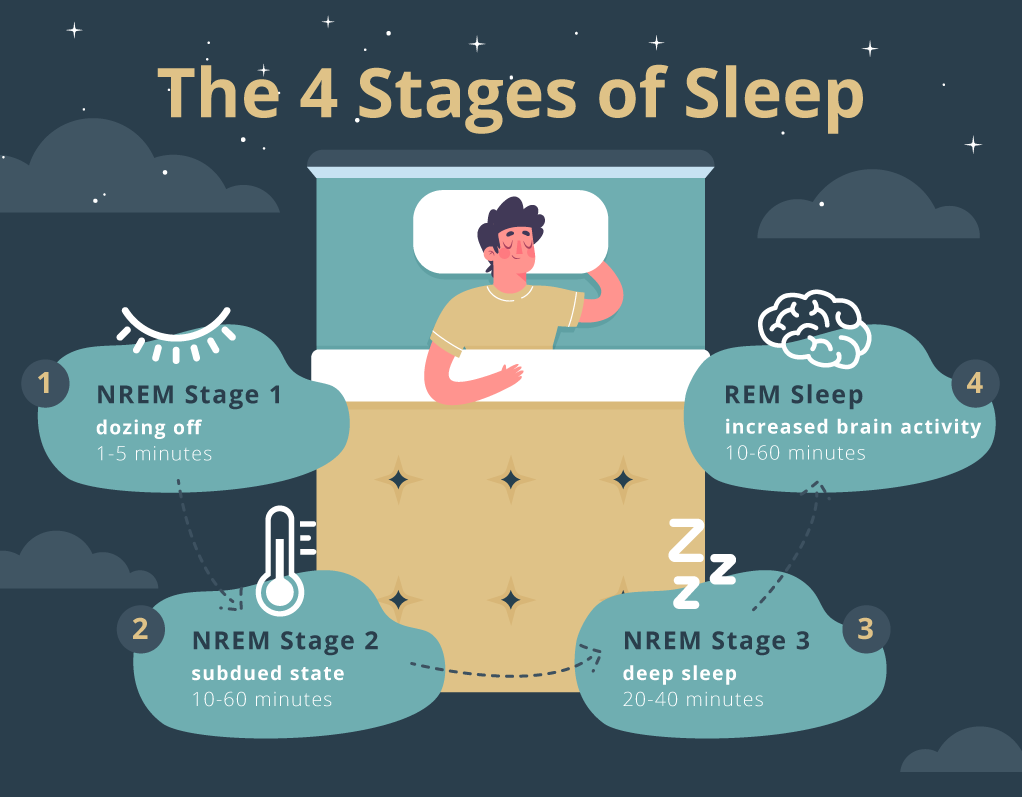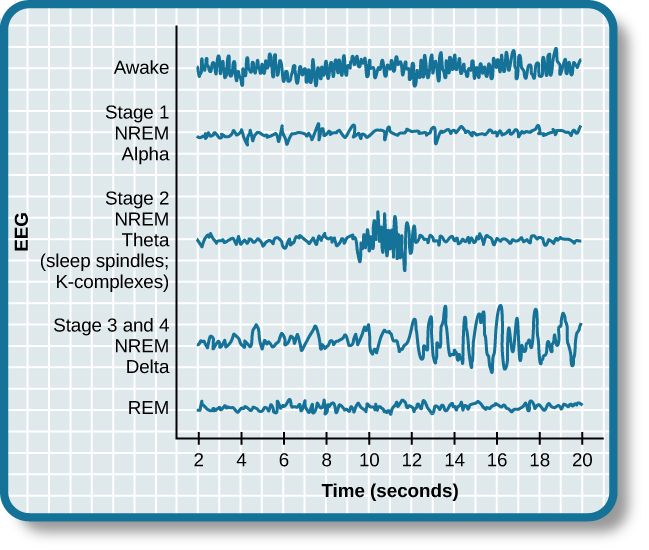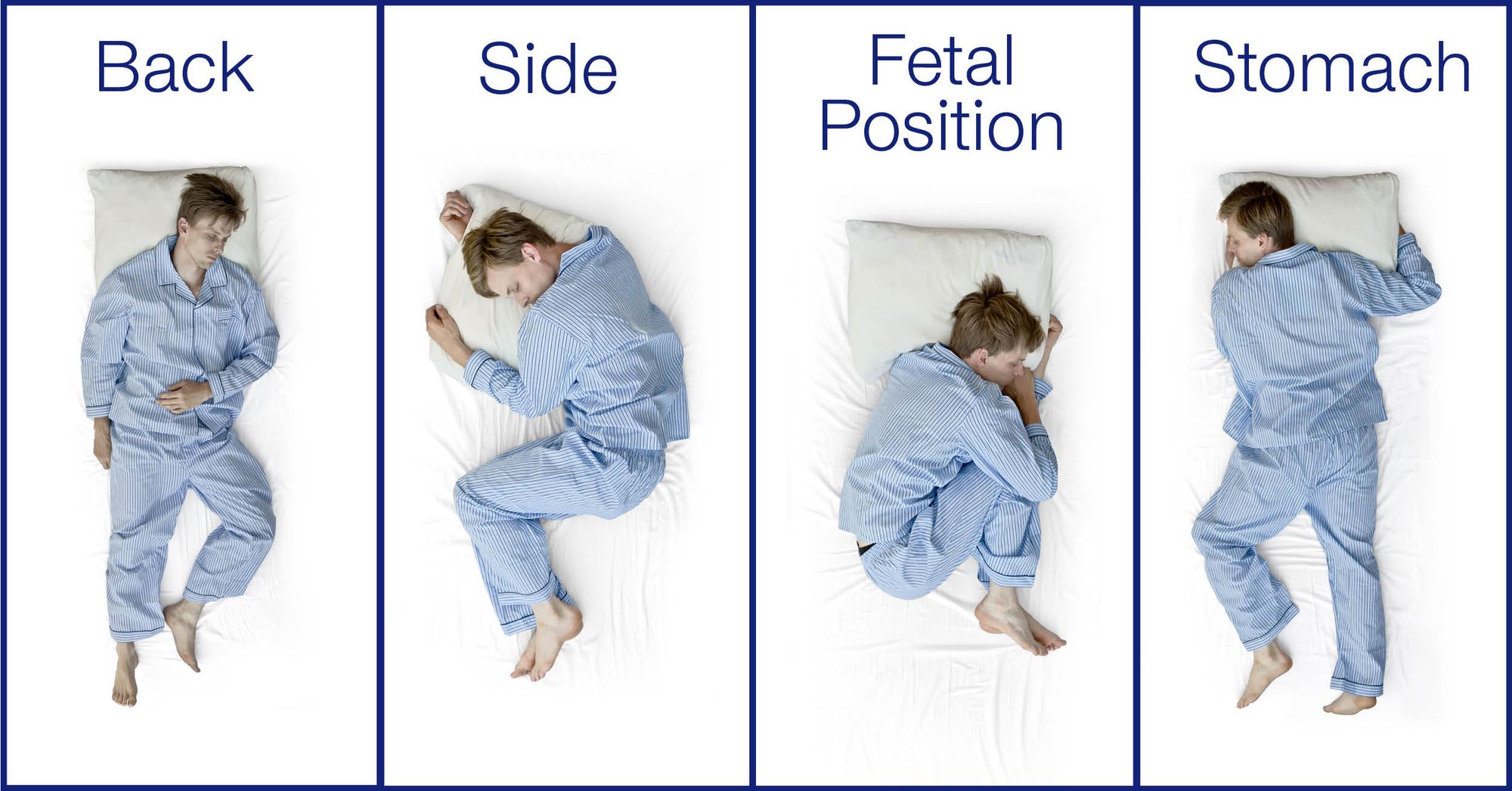What Does Good Sleep Actually Mean & What Factors Affect It?
Good sleep can be affected by many different factors. Learn about them and perhaps learn how to get your best sleep yet!

We’ve all heard it by now: “make sure you get 8 hours of sleep.” Sleep plays a huge role in our development, rest, and general well-being. Just think, an AAA study found that driving while tired is on the same level as driving drunk,1 as drivers who miss 2-3 hours of sleep compared to people who get 7 hours of sleep are 4x more likely to get into a car crash.1
We all probably know that sleep is really important but what might be lesser known is what does ‘good sleep’ actually mean? Why is it that some nights we sleep like a baby and some nights we’re lucky to get a few hours here and there?
Understanding Sleep Stages & Cycles

Our sleep cycle is very important to how rested we are when we wake up. There are 4 stages of sleep, and we typically go through these stages 4-6 times per night.
- Stage 1: The body and brain are starting to slow down2 and you transition from awake to resting.3 It only lasts about 1-5 minutes and it’s easy to wake somebody in this stage.2
- Stage 2: The brain significantly slows down and the brain activity that does occur actually helps you from being woken up during this stage.2 Sleep spindles are very high frequency brain waves4 (as seen below) that occur during this stage and are believed to be important for learning. This stage usually lasts between 10-25 minutes in the first cycle and gets longer; typically, you’ll spend 50% of your sleep in this stage.2
- Stage 3: This is deep sleep that allows your body to build muscle and bone, repair your cells, and strengthen your immune system.3 People woken up in this stage are disoriented and have decreased mental performance.3 This stage lasts 20-40 minutes but decreases in length in later cycles as the night progresses.2
- Stage 4: This is called REM (rapid eye movement) sleep. Your muscles will experience a temporary paralysis, but your eyes will be rapidly moving and your brain waves will actually be similar to somebody who is awake,2 as you can see below. You may have vivid dreams during this stage, and it’s believed that REM sleep is important for learning and memory.2 In the first cycle, REM sleep is only about 10 minutes but in the last sleep cycle it can last up to an hour.2

Going through the sleep cycles properly is important for different parts of our functioning and being interrupted at different stages of sleep may have big consequences.
Factors Affecting Good Sleep
Sleep Consistency
In addition to how long you actually sleep, the consistency of hours that you sleep night after night is also important.5 One interesting finding is that people that have a greater sleep consistency in when they go to sleep and when they wake up, get more deep and REM sleep.6 This means that they spend more time in the stages of sleep that focus on restoring our body and building up bodily functions.6
Researchers even found a link between sleep consistency and grades! A common problem that adolescents face is sleeping less than the recommended hours during weekdays and compensating for this by oversleeping on weekends.5 Across numerous studies scientists have found that sleep inconsistency is associated with lower academic scores.5
Light & Temperature
The external environment greatly influences how well we sleep. Light can make it difficult to fall asleep if it disrupts our internal clock.7 Our internal clock tells us when it’s time to sleep and because we have more light in the evenings, our internal clock may prefer a later nighttime sleep schedule.7 This can make it difficult to get good sleep, as falling asleep can become more difficult and because we may be more prone to waking up at night because of light.7
It’s also well known that sleep is linked to temperature.8 And research reveals that too high or low of a temperature can disrupt our sleep. This can be very serious because disturbed nighttime sleep can be linked to obesity and worse quality of life.8
Relationships
Our waking lives have a big impact on our sleep as well. Researchers have been interested in the link between relationships and sleep and in one study found that on days that partners had more positive interactions with their significant other, they actually slept more.9
Another study on college students found that students that had a more active social life (e.g. attended various social events) had less trouble falling and staying asleep.9 Maybe maintaining good relationships while awake is a good strategy for good sleep!
Types of Sleepers

Different types of sleep positions come with different advantages and challenges.
Back Sleepers
Back sleepers don’t put any pressure on their head, neck, and spine10 and might have better spinal alignment because of this.11 But this sleep position is also associated with worsening conditions like snoring and sleep apnea.11 It’s also not recommended for pregnant women because sleeping in this position might be associated with stillbirths in later pregnancy.12
Side Sleepers
Sleeping on the side is the sleep position that most people prefer.11 Researchers believe that this preference to sleep on the side is because we become less flexible as we age.11 This position is good for us because it helps open our airways and allows us to easily breathe.10 However, some individuals prefer to sleep on their right side over their left side, such as patients with heart failure; perhaps because they want to avoid discomfort.11
Fetal Position
Sleeping in the fetal position shares the same advantages of side sleeping (e.g. clear airways, easier to breathe).11 However, if you curl in too tightly, you might experience joint pain or stiffness.11 If you sleep in the fetal position, try to go for a loose curled position or put a pillow between your knees.11
Stomach Sleepers
Sleeping on the stomach can make breathing difficult10 and is associated with higher heart rates and potentially increased likelihood of sudden infant death syndrome for babies.11 This position is typically more difficult to sleep in because it requires extra energy to breathe regularly.11 If you sleep in this position, it’s recommended that you sleep with a flat pillow under your pelvis or sleep without a pillow under your head to support proper spine alignment.11
Sleep is essential for our proper functioning and can be affected by so many different factors. Sleep research is a big area of research and there are studies that are recruiting to learn more about this topic today!
Honeybee
Connects the community with research. Honeybee is a web and mobile app to participate in research, discover yourself, and earn cash and rewards.
References
1. AAA study finds risks of drowsy driving comparable to drunk driving. Accessed August 3, 2021. https://www.cbsnews.com/news/aaa-study-drowsy-driving-dangers-comparable-to-drunk-driving/
2. Stages of Sleep. Sleep Foundation. Published August 14, 2020. Accessed August 3, 2021. https://www.sleepfoundation.org/how-sleep-works/stages-of-sleep
3. Sabado L. What is Circadian Rhythm and the Stages of Sleep? Learn About the Sleep Cycle Stages from SleepMoment. SleepMoment.com. Published February 11, 2021. Accessed August 3, 2021. https://www.sleepmoment.com/circadian-rhythm-and-sleep-stages/
4. Stages of Sleep | Introduction to Psychology. Accessed August 3, 2021. https://courses.lumenlearning.com/wsu-sandbox/chapter/stages-of-sleep/
5. Sleep quality, duration, and consistency are associated with better academic performance in college students | npj Science of Learning. Accessed August 3, 2021. https://www.nature.com/articles/s41539-019-0055-z
6. Labs DI. The Importance of Sleep Consistency | The Locker. WHOOP. Accessed August 3, 2021. http://www.whoop.com/thelocker/sleep-consistency-more-to-sleep-than-sleep-need/
7. External Factors that Influence Sleep | Healthy Sleep. Accessed August 3, 2021. https://healthysleep.med.harvard.edu/healthy/science/how/external-factors
8. Okamoto-Mizuno K, Mizuno K. Effects of thermal environment on sleep and circadian rhythm. J Physiol Anthropol. 2012;31(1):14. doi:10.1186/1880-6805-31-14
9. Tavernier R. Want better sleep? Spend face-to-face time with your friends and family. The Conversation. Accessed August 3, 2021. http://theconversation.com/want-better-sleep-spend-face-to-face-time-with-your-friends-and-family-80718
10. Newsroom - Pillow Talk: What Sleeping Positions Mean For Your Health. Accessed August 3, 2021. https://newsroom.uhc.com/health/sleeping-positions-mean-for-your-health.html
11. Which Sleeping Position is the Best For You? Sleep.org. Accessed August 3, 2021. https://www.sleep.org/best-sleep-position/
12. Heazell A, Li M, Budd J, et al. Association between maternal sleep practices and late stillbirth - findings from a stillbirth case-control study. BJOG. 2018;125(2):254-262. doi:10.1111/1471-0528.14967

